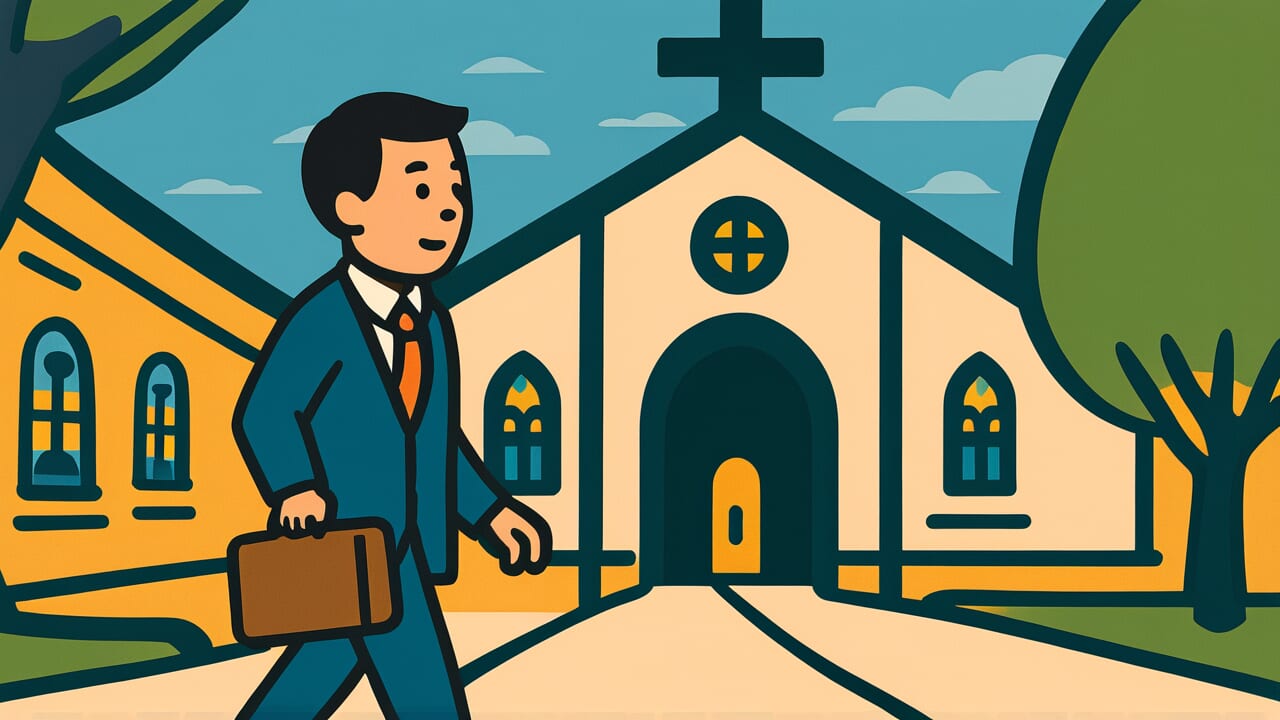How to Read “The nearer the church the later to mass”
The nearer the church the later to mass
[NEER-er thuh church thuh LAY-ter too mas]
“Mass” refers to a church service in this old saying.
Meaning of “The nearer the church the later to mass”
Simply put, this proverb means that people who live closest to their responsibilities are often the most likely to neglect them.
The saying paints a picture of someone who lives right next to a church. You might think they would always arrive early for services. Instead, they often show up late or skip entirely. They figure they can always go tomorrow since the church is so close. Meanwhile, people who live far away make the effort to arrive on time.
This wisdom applies to many modern situations. Students who live closest to school might skip classes more often. Workers who live near the office might arrive late more frequently. People with the most natural talent sometimes practice the least. The very convenience that should make something easier actually makes people careless about it.
What makes this insight so interesting is how it reveals human nature. We tend to value things less when they come easily to us. Distance and difficulty often create respect and commitment. When something requires effort to reach, we appreciate it more and treat it with greater care.
Origin and Etymology
The exact origin of this proverb is unknown, but it appears to be several centuries old. It likely emerged during times when church attendance was a central part of community life. Most versions of this saying come from European traditions where villages were built around churches.
During medieval and early modern periods, regular church attendance was both a religious duty and social expectation. Communities were small and tightly knit. Everyone knew who attended services and who did not. The church often sat at the center of town, with houses spreading outward in rings.
The saying probably spread through oral tradition before appearing in written collections of proverbs. Similar versions exist in different languages, suggesting the observation was common across cultures. Over time, people began using it beyond religious contexts. Today we apply it to any situation where familiarity breeds neglect of duty or opportunity.
Interesting Facts
The word “mass” comes from Latin “missa,” meaning “dismissal,” referring to the end of a church service when people were sent forth. Churches were traditionally built at the center of European villages, making them the closest building for many residents. This proverb uses contrast structure, comparing “nearer” with “later” to highlight the ironic relationship between proximity and punctuality.
Usage Examples
- Manager to colleague: “Our IT guy still hasn’t updated his own computer – the nearer the church the later to mass.”
- Wife to husband: “The mechanic’s car has been making that noise for months – the nearer the church the later to mass.”
Universal Wisdom
This proverb captures a fundamental quirk of human psychology that has puzzled people for generations. We consistently undervalue what comes easily to us while overvaluing what requires struggle to obtain. This pattern appears everywhere because it reflects how our minds evolved to assess worth and allocate attention.
Our ancestors developed mental shortcuts to survive in a world of limited resources. Scarcity usually meant value, while abundance often meant something was common or less important. Things that required effort to reach were typically more valuable than things readily available. This mental programming helped humans make quick decisions about where to invest their energy. However, this same wiring can work against us when proximity actually represents opportunity rather than lesser value.
The deeper truth here involves how familiarity affects our sense of urgency and appreciation. When something is always available, we lose the fear of missing out that motivates action. We assume we can always access it later, so we postpone engagement. This creates a paradox where the people best positioned to benefit from something are often the least likely to take advantage of it. The saying endures because it names a pattern we all recognize but rarely examine closely.
When AI Hears This
Living close to something creates a dangerous mental trick. People assume nearby opportunities will always wait for them. This false sense of endless availability makes them careless with timing. The church neighbor thinks “I can leave anytime” but never actually leaves.
This reveals how humans confuse location advantages with time advantages. Close distance feels like extra time, but it’s not. The mind treats physical closeness as a safety net for poor planning. People mistake spatial convenience for temporal control, creating their own obstacles.
What fascinates me is how this “flaw” might actually protect humans. Maybe being late to nearby events forces deeper appreciation when you finally arrive. Perhaps the struggle of rushing short distances creates memorable experiences. This seemingly broken thinking might make life richer through manufactured difficulty.
Lessons for Today
Understanding this wisdom starts with recognizing it in your own life. Notice where convenience has bred complacency. Maybe you skip opportunities that others would treasure simply because they come easily to you. The first step is awareness without judgment. This tendency is natural, not a character flaw.
In relationships, this pattern shows up when we take people closest to us for granted. Family members and old friends might receive less attention than new acquaintances. We assume they will always be there, so we invest less effort in those connections. Recognizing this can help us consciously choose to value proximity rather than dismiss it.
The key is not to create artificial scarcity or make things harder than necessary. Instead, we can develop gratitude for what comes easily and create personal systems that maintain engagement despite convenience. This might mean setting regular commitments or finding ways to refresh your perspective on familiar opportunities. The goal is to see nearness as a gift rather than an excuse for laziness.



Comments